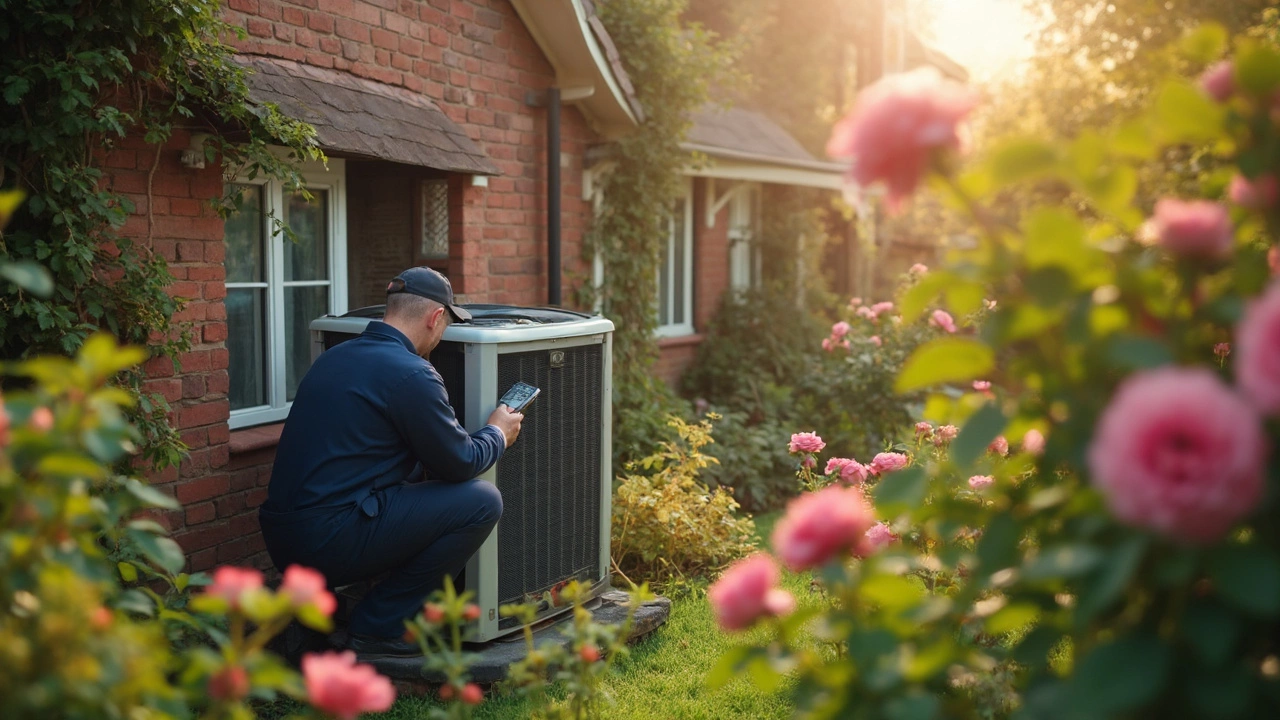So, the burning question on everyone's mind: are heat pumps expensive to fix? It's one of those things that can cause a bit of stress when your heating and cooling system starts acting up. But here's the deal—knowing what you're dealing with can save you time and money.
First off, it's crucial to get a handle on what might be causing the trouble. Heat pumps, like any other home appliance, have their quirks. Common problems include refrigerant leaks, thermostat malfunctions, or even issues with electrical connections. These are not entirely rare and usually not super heavy on the pocket.
Navigating the costs can be tricky because it varies greatly depending on the issue. Simple fixes like replacing a thermostat or recharging the refrigerant are relatively affordable. However, if the compressor needs a fix, that's another story. Understanding these costs can help you plan better.
- Understanding Heat Pump Problems
- Common Costs of Repair
- Prevention Tips for Homeowners
- Deciding Between Repair and Replacement
Understanding Heat Pump Problems
Alright, let’s break down some common issues that might make your heat pump act more like a stubborn mule than a trusty steed. These insights not only help you identify what might be going wrong but give you a heads-up on when you might need a heat pump repair. No one wants to be in the dark with this stuff, right?
Refrigerant Leaks
Refrigerant is the magic potion for the heat pump, doing the heavy lifting of transferring heat. If there’s a leak, it’s like trying to cook soup with no broth. You’ll notice the system isn’t heating or cooling efficiently, and it might even make some hissing sounds. Not fixing this can lead to skyrocketing bills or a frozen system.
Thermostat Problems
Is your heat pump not turning on, or the home's temperature is all over the place? The thermostat might be on the fritz. Sometimes, it’s just a matter of checking the settings—it may have been accidentally bumped—or it might be time for a replacement.
Electrical Issues
If you’ve got a heat pump playing funny games like randomly switching off, the cause might be electrical. Could be a tripped circuit breaker or a more complex wiring issue. These problems often require a professional to poke around, so don’t reach for your toolbox unless you know your volts from your amps!
Frozen Coils
In the cold months, if your heat pump looks like it belongs in the Arctic with its frozen coil, then you’ve got a problem. This could result from poor airflow due to dirty air filters or malfunctioning fans. Regular maintenance can fend off this chilly disaster.
Let’s look at a snapshot of some common issues and fix costs:
| Problem | Repair Cost (Approx.) |
|---|---|
| Refrigerant Leak | $200 - $1,500 |
| Thermostat Replacement | $100 - $300 |
| Electrical Issues | $75 - $200 (hourly labor) |
| Frozen Coils | $150 - $800 |
A heads-up: prices can swing based on your location, the type of heat pump, and service charges, but this gives you a ballpark.
Common Costs of Repair
Figuring out the typical cost of fixing heat pumps isn't just about random guesses. It's more about understanding what might break and how much it could hit your wallet. Let's break it down, so you know what you might be up against.
Typical Repair Costs
So, what's the deal with repair costs? It varies, but knowing a ballpark figure helps you budget. Simple repairs, like a messed-up thermostat, usually land between $100 and $300. This is the low-end of the spectrum, primarily because it's just a component swap.
However, if we're talking about a refrigerant recharge, you're looking at another common but slightly steeper cost, around $200 to $500. This mainly depends on what's needed and local labor rates. Now, if the issue hits the heart of the system, like a compressor problem, brace yourself for a charge ranging from $1,000 to $2,500.
Uncommon Repairs
Nobody wants a curveball like a serious electrical issue or a busted blower motor. These typically need more labor and specific parts, so expect costs to rise from $400 to $1,200. It's not as frequent but good to know what you're in for.
Cost Breakdown by Component
Here's a quick look at what you might expect to pay for some common issues:
| Repair Type | Cost Range |
|---|---|
| Thermostat Replacement | $100 - $300 |
| Refrigerant Recharge | $200 - $500 |
| Compressor Repair/Replacement | $1,000 - $2,500 |
| Blower Motor Repair | $400 - $1,200 |
DIY or Professional Help?
Some small chores might be DIY-friendly if you're confident. Replacing filters or fixing simple leaks can be tackled with a bit of elbow grease. But when it comes to complex stuff like compressors or electrical parts, calling in a pro is usually the safest bet.
In a nutshell, knowing these heat pump maintenance costs helps prepare for any surprises. Not the most exciting thing, but essential for keeping your system running smoothly without unexpected expenses.

Prevention Tips for Homeowners
Keeping your heat pump running smoothly might sound like a chore, but trust me, a little effort goes a long way. A well-maintained heat pump can last around 15 years without too much fuss, which is no small feat.
Regular Maintenance Checks
The first trick up your sleeve should be regular maintenance check-ups. And by regular, we mean at least once or twice a year. Just like going to the dentist! A professional will spot potential issues early, saving you from sudden costs down the line—like those surprise root canals.
- Check filters monthly for dirt and replace them every few months.
- Keep the outdoor unit free of leaves, snow, and dirt. Sweep around it regularly.
- Ensure that the unit is level and not tilted. An uneven heat pump can cause strain.
DIY Dusting and Cleaning
Don't underestimate DIY cleaning! A clean heat pump is a happy heat pump. Dust and grime can clog up the system and make it less efficient.
- Turn off the power before you start cleaning. Safety first!
- Gently rinse the outdoor coils with a garden hose. Avoid using a pressure washer as it can damage the unit.
- Wipe down the indoor vents with a damp cloth to prevent dust build-up.
Optimal Use Practices
How you use your heat pump can make a world of a difference. For instance, setting the thermostat properly avoids overworking the system.
- Set your thermostat to a moderate temperature and avoid drastic changes.
- Use the timer features to pre-heat or cool rooms.
- Consider zoning systems to only heat or cool rooms that are in use.
Keep an Eye on Energy Bills
Keeping track of your energy bills acts as an early warning system—an unexpected spike could mean your heat pump is working too hard. Regular monitoring helps catch problems before they demand expensive heat pump repair.
By following these straightforward tips, you can save yourself the headache of untimely breakdowns and costly repairs. Plus, a well-cared-for heat pump uses less energy, which is a win-win for your wallet and the planet!
Deciding Between Repair and Replacement
Alright, so your heat pump is on the fritz, and you're staring at it wondering whether to fix it or throw in the towel for a new one. This decision isn't black and white but let's break it down.
When to Consider a Repair
If your heat pump is relatively new, say less than 10 years old, and it's only had minor issues in the past, fixing it might be the way to go. Repairs for things like a thermostat glitch or a refrigerant recharge are usually cost-effective, especially if your warranty covers some of the costs.
- If the repair cost is less than a third of the replacement price, repair makes more sense financially.
- Consider the age and repair history of the unit. Younger units with little past trouble are often good candidates for repair.
When Replacement Is a Better Bet
If your system is nearing its 15th birthday, it might be time to think about replacement. Newer models are more energy-efficient and could save you big bucks in the long run on your electric bill. Plus, constant repairs on an old system can add up quickly, often making a new purchase a smarter choice.
- Should the repair cost exceed 50% of what a new system would cost, replacing is usually more economical.
- If your energy bills have been climbing, a new, efficient model could help bring those down.
Factoring In Efficiency and Incentives
Now, there are also incentives to consider. Many places offer rebates or tax credits for installing high-efficiency heat pumps, which can significantly offset the cost of a new system. This makes a replacement even more appealing if your current setup is outdated.
| Age | Recommendation |
|---|---|
| 0-10 years | Usually repair |
| 10-15 years | Consider efficiency and costs |
| 15+ years | Likely replace |
In the end, weighing your options carefully with cost, age, and efficiency in mind will guide you in making the choice that best suits your home and wallet.
